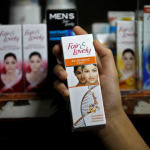Discover The Ultimate Solution For Bright And Radiant Skin With Skin Bleaching 1 – Unlock Your Glow Today!
Skin Bleaching 1: A Comprehensive Guide to Lightening Your Skin
Greetings, Readers!
Today, we are going to delve into the topic of skin bleaching and explore the various aspects surrounding it. Skin bleaching, also known as skin lightening or skin whitening, is a cosmetic procedure that aims to lighten the skin tone. It has gained popularity in recent years, but it is important to understand the risks and benefits associated with it before considering this option.
2 Picture Gallery: Discover The Ultimate Solution For Bright And Radiant Skin With Skin Bleaching 1 – Unlock Your Glow Today!


Table of Contents
1. Introduction
2. What is Skin Bleaching?

Image Source: fruugo.com
3. Who Can Benefit from Skin Bleaching?
4. When is the Right Time to Consider Skin Bleaching?

Image Source: media-amazon.com
5. Where Can You Get Skin Bleaching Treatments?
6. Why Do People Choose Skin Bleaching?
7. How Does Skin Bleaching Work?
8. Advantages of Skin Bleaching
9. Disadvantages of Skin Bleaching
10. Frequently Asked Questions
11. Conclusion
12. Final Remarks
1. Introduction
Skin bleaching is a popular cosmetic procedure that involves lightening the skin tone. It is often used to address issues such as hyperpigmentation, dark spots, or uneven skin tone. However, it is essential to understand that skin bleaching is a complex process that should be approached with caution.
There are different methods available for skin bleaching, ranging from topical creams and lotions to more invasive procedures such as chemical peels or laser treatments. Each method has its own set of advantages and disadvantages, and it is crucial to consult with a dermatologist before undergoing any procedure.
In this article, we will provide you with a comprehensive guide to skin bleaching, covering everything from what it is and who can benefit from it to the advantages, disadvantages, and frequently asked questions about this procedure. We hope that by the end of this article, you will have a better understanding of skin bleaching and be able to make an informed decision.
Now, let’s dive into the details and explore the world of skin bleaching together.
2. What is Skin Bleaching?
Skin bleaching refers to the process of using various techniques and products to lighten the skin tone. It involves reducing the melanin content in the skin, which is responsible for giving it color. The aim of skin bleaching is to achieve a lighter and more even complexion.
There are several reasons why individuals may choose to undergo skin bleaching. It can be used to address skin concerns such as hyperpigmentation, dark spots, acne scars, or melasma. Additionally, some people may choose skin bleaching for cosmetic reasons, desiring a lighter skin tone.
While skin bleaching can be effective in achieving the desired results, it is important to note that it is not a permanent solution. Regular maintenance and sun protection are necessary to maintain the desired skin tone.
3. Who Can Benefit from Skin Bleaching?
Skin bleaching can be beneficial for individuals who have specific skin concerns or desire a lighter skin tone. Here are some common groups of people who may consider skin bleaching:
1. Individuals with hyperpigmentation or dark spots on their skin.
2. People with melasma, a condition characterized by brown or gray patches on the skin.
3. Individuals with acne scars or blemishes.
4. Those who have uneven skin tone and desire a more uniform complexion.
5. People who want to achieve a lighter skin tone for cosmetic reasons.
It is important to consult with a dermatologist to determine if skin bleaching is suitable for your specific situation and skin type.
4. When is the Right Time to Consider Skin Bleaching?
The decision to consider skin bleaching is a personal one and should be made after careful consideration. Here are some factors to consider when determining if it is the right time for you to undergo a skin bleaching procedure:
1. Your skin concerns: If you have specific skin concerns such as hyperpigmentation or dark spots that have not responded to other treatments, skin bleaching may be an option worth exploring.
2. Your skin type: It is important to understand that not all skin types are suitable for skin bleaching. Individuals with darker skin tones may be more prone to side effects and should consult with a dermatologist before proceeding.
3. Your expectations: It is essential to have realistic expectations when considering skin bleaching. Understand that it is not a permanent solution and will require regular maintenance.
4. Sun protection: Adequate sun protection is crucial both before and after undergoing skin bleaching. Exposing your skin to the sun without protection can lead to further skin damage.
5. Consultation with a dermatologist: Before undergoing any skin bleaching procedure, it is important to consult with a dermatologist. They can evaluate your skin type, assess your concerns, and recommend the most suitable treatment option for you.
5. Where Can You Get Skin Bleaching Treatments?
Skin bleaching treatments can be obtained from various sources, including:
1. Dermatology clinics: Dermatologists are specialized in treating skin conditions and can provide professional advice and guidance regarding skin bleaching.
2. Aesthetic clinics: These clinics offer a range of cosmetic procedures, including skin bleaching. However, it is important to choose a reputable clinic and ensure that the practitioners are trained and qualified.
3. Over-the-counter products: There are numerous over-the-counter skin bleaching products available in the market. However, it is crucial to exercise caution and read the labels carefully. Consultation with a dermatologist is recommended before using any such products.
6. Why Do People Choose Skin Bleaching?
The reasons why individuals choose skin bleaching vary from person to person. Here are some common motivations behind this decision:
1. Addressing skin concerns: Skin bleaching can help individuals address specific skin concerns such as hyperpigmentation, dark spots, or acne scars.
2. Cosmetic reasons: Some people choose skin bleaching for cosmetic purposes, desiring a lighter skin tone or a more even complexion.
3. Boosting self-confidence: Achieving the desired skin tone can boost self-confidence and improve one’s self-esteem.
4. Cultural norms: In some cultures, lighter skin is considered more desirable, leading individuals to explore skin bleaching as an option.
It is important to understand your motivations and ensure that you are making an informed decision before undergoing any skin bleaching procedure.
7. How Does Skin Bleaching Work?
Skin bleaching works by reducing the amount of melanin, the pigment responsible for skin color, in the skin. There are different methods and products available for this purpose. Here are some common techniques used in skin bleaching:
1. Topical creams and lotions: These products contain ingredients such as hydroquinone, kojic acid, or alpha-arbutin, which inhibit melanin production.
2. Chemical peels: This method involves applying a chemical solution to the skin, which causes the top layers to peel off, revealing lighter and smoother skin.
3. Laser treatments: Laser technology can be used to target and break down melanin in the skin, leading to a lighter complexion.
4. Microdermabrasion: This procedure involves exfoliating the skin using microcrystals, revealing fresher and lighter skin.
It is important to note that some skin bleaching methods may have potential side effects, and it is crucial to consult with a dermatologist before undergoing any procedure.
8. Advantages of Skin Bleaching
While skin bleaching can have its benefits, it is important to approach it with caution. Here are some advantages of skin bleaching:
1. Addressing specific skin concerns: Skin bleaching can help individuals address specific skin concerns such as hyperpigmentation, dark spots, or scars.
2. Improved self-confidence: Achieving the desired skin tone can boost self-confidence and improve one’s self-esteem.
3. Enhancing appearance: Skin bleaching can lead to a more even complexion and a brighter, youthful appearance.
4. Increased options for makeup: With a lighter skin tone, individuals may have more options when it comes to choosing makeup shades.
5. Treating melasma: Skin bleaching can be an effective treatment for melasma, a condition characterized by brown or gray patches on the skin.
While these advantages may be appealing, it is important to consider the potential risks and consult with a dermatologist before undergoing any skin bleaching procedure.
9. Disadvantages of Skin Bleaching
Alongside the advantages, it is crucial to be aware of the potential disadvantages and risks associated with skin bleaching. Here are some disadvantages to consider:
1. Skin irritation: Some individuals may experience skin irritation, redness, or sensitivity after undergoing skin bleaching procedures.
2. Uneven results: Achieving an even skin tone can be challenging, and some individuals may experience uneven results or patches of lighter or darker skin.
3. Potential side effects: Certain skin bleaching ingredients, such as hydroquinone, may have potential side effects, including skin thinning, increased sun sensitivity, or ochronosis.
4. Dependency on maintenance: Skin bleaching requires regular maintenance to maintain the desired skin tone. Discontinuing the treatment may result in the skin returning to its original color.
5. Psychological impact: The desire to achieve a lighter skin tone can have psychological implications and may stem from societal pressures or internalized biases.
It is vital to thoroughly research and consult with a dermatologist before proceeding with any skin bleaching procedure to understand the potential risks and make an informed decision.
10. Frequently Asked Questions
1. Is skin bleaching safe?
Skin bleaching can be safe when performed under the guidance of a dermatologist and with the use of approved products. However, it is essential to note that there are potential risks and side effects associated with this procedure. Consulting with a professional is crucial to ensure safety.
2. How long does it take to see results?
The time required to see results may vary depending on the method used and individual factors. Some individuals may start noticing improvement within a few weeks, while others may require several months of consistent treatment.
3. Can skin bleaching be permanent?
Skin bleaching is not a permanent solution. Regular maintenance and sun protection are necessary to maintain the desired skin tone. Discontinuing the treatment may result in the skin returning to its original color.
4. Are there any natural alternatives to skin bleaching?
Some individuals may opt for natural alternatives to skin bleaching, such as using ingredients like lemon juice, aloe vera, or turmeric. However, it is important to note that natural remedies may not be as effective as professional treatments and may have their own set of risks.
5. Are there any alternatives to skin bleaching?
There are alternative treatments available for addressing specific skin concerns. These may include topical creams, exfoliation methods, or laser treatments. It is important to consult with a dermatologist to determine the most suitable alternative for your specific situation.
11. Conclusion
Skin bleaching is a cosmetic procedure that aims to lighten the skin tone. While it can be beneficial for addressing specific skin concerns or achieving a desired skin tone, it is crucial to approach it with caution. Consulting with a dermatologist is essential to determine if skin bleaching is suitable for your skin type and concerns.
We have discussed the various aspects of skin bleaching, including what it is, who can benefit from it, the advantages and disadvantages, and frequently asked questions. It is important to weigh the risks and benefits before making a decision and to prioritize your skin’s health and safety.
Remember, beauty comes in all shades, and it is essential to embrace and love your natural skin tone. If you do choose to undergo skin bleaching, do it for yourself and not under societal pressure or external expectations.
12. Final Remarks
In conclusion, skin bleaching is a cosmetic procedure that should be approached with caution. It is essential to consult with a dermatologist before undergoing any treatment to ensure that it is suitable for your specific situation.
While skin bleaching can address specific skin concerns and improve self-confidence, it is important to consider the potential risks and disadvantages associated with this procedure. Embracing and loving your natural skin tone is also crucial, as beauty comes in all shades.
Lastly, it is essential to prioritize your skin’s health and safety. Regularly using sunscreen, practicing a good skincare routine, and consulting with professionals can help you achieve and maintain healthy, radiant skin.
This post topic: Skin Care
